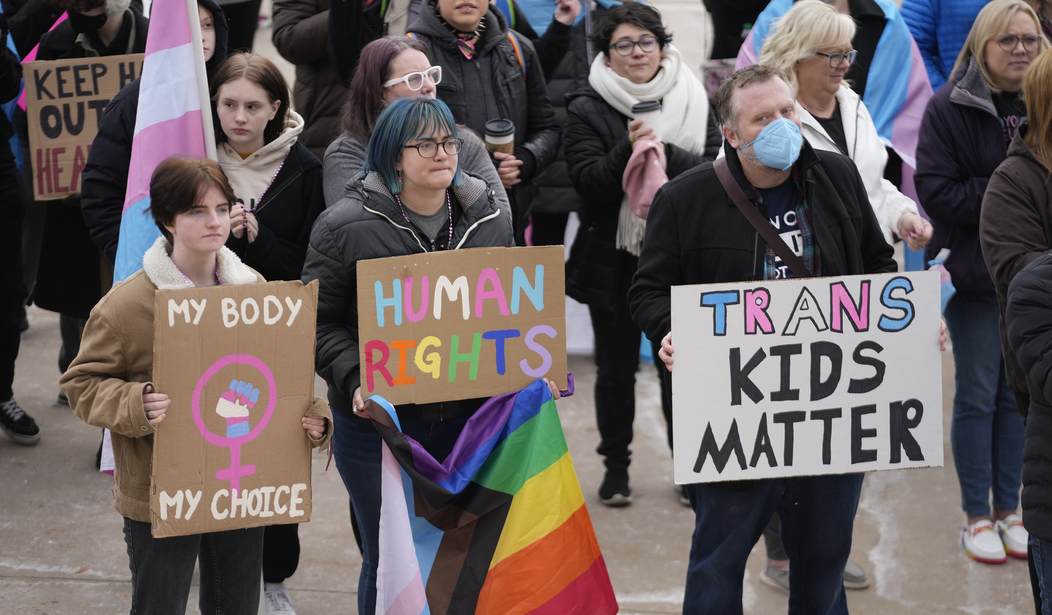When Dr. Paul McHugh was head of the Psychiatry Department at Johns Hopkins in 1979, he decided to close down the school's world-famous sex change clinic. It wasn't controversial at the time, recalls McHugh, although the clinician who created it, John Money, was very unhappy. But “all the other people at the hospital, even including many of the plastic surgeons, agreed," recalled McHugh.
The reason for his decision to close the clinic was that patients who had the sex change surgery "didn’t show much by way of improvement in their 'interpersonal relations' and overall well-being," writes UnHerd's Sohrab Ahmari in an excellent profile of McHugh.
The idea of changing one's sex, to McHugh, was akin to “collaborating with madness.” McHugh recalls that the specialists who created trans surgeries didn’t really think that they were “turning a man into a woman.” They thought they’d make life “easier, more comfortable” for the patient.
Of course, that idea has been turned on its head in the 21st century to include the whackadoodle notion that some people are "born into the wrong body" and that gender is a "social construct."
The madness of gender ideology claims that both notions are not mutually exclusive, while McHugh rejected that impossible idea. He was forced to resign his chair in 2001, but he continued critiquing the growing medical craziness that has tragically captured so many young people.
McHugh continued on the Johns Hopkins faculty, even creating a program on human flourishing. But the gender Nazis wouldn't let him be. "By the mid-2010s, he’d emerged as the trans movement’s Public Enemy No. 1," Ahmari writes.
The Human Rights Campaign in 2017 launched an entire website to “debunk” his work. The advocacy group GLAAD created an “accountability” profile on him (complete with an unflattering portrait) that busted him for claiming, among other things, that “gender ideology harms children,” and that transitioning kids is akin to performing liposuction on anorexics.
In 2016, The Advocate, an LGBT publication, described McHugh as a “notoriously antitransgender psychiatrist,” singling out his statements that “‘sex change’ is biologically impossible” and that “People who undergo sex-reassignment surgery do not change from men to women or vice versa.” A 2017 Washington Post article cheered the resumption of reassignment surgeries at Johns Hopkins, under the headline: “Long Shadow Cast by Psychiatrist on Transgender Issues Finally Recedes at Johns Hopkins.”
By 2022, "peak-woke" had broken the fever, and McHugh's work was saved from the lynch mob. In Europe, the Tavistock Clinic was closed, and other gender clinics in Scandinavia stopped treating children. In 2023, the university’s president, Ron Daniels, intervened "to preserve McHugh’s name on his legacy program," Ahmari writes.
"You can’t take the name off a program [associated with] an active faculty unless he’s had some infraction,” McHugh paraphrases Daniels in announcing his decision to maintain his name associated with the human flourishing program.
Last week, McHugh received the Medal for Intellectual Freedom from the American Academy of Sciences and Letters. He was recognized for his lifelong dedication to freedom of inquiry.
When he first became chairman of the Hopkins Psychiatry Department, there was a war between the Freudian school of psychoanalysis and experimental, evidence-first psychiatry, which looked first to the brain to rule out a physical cause of a condition. Rather than silence the Freudians, he gave them the freedom to learn and work. Ahmari notes, "He continued to maintain a psychoanalytic presence in the department, and funded the expensive training analyses aspiring Freudian therapists must undergo."
What a contrast with the gimlet-eyed gender authoritarians who run most psychiatric programs today. McHugh would have been burned at the stake and driven into the wilderness for his views.
Meanwhile, he conducted research in many other areas, including schizophrenia, pedophilia, and what used to be called multiple personality disorder, among other conditions. As the years wore on, experimental psychiatrists like McHugh would find themselves in a curious alliance of sorts with the Freudians, as both faced the fury of the anti-psychiatry movements promoted by the likes of Thomas Szasz in America and Michel Foucault and his disciples in Europe.
The idea was that mental illness is an invention of the institutions that treat the mentally ill and valorize themselves in the process. “Get rid of the psychiatrist, and you get rid of mental illness,” as McHugh sums up the anti-psychiatric creed, which he likens to the view that crime is a social construct used by the police and justice systems to maintain and expand their institutional power.
He was demonized for maintaining a scientific rigor on questions relating to gender. As it stands now, most dissenters from gender orthodoxy are driven from their jobs and ostracized. McHugh's reputation may have been tarnished by the crazies, but he never submitted to the ideological purity tests the gender Nazis demanded of him.
At 94, he's still going strong.
“It’s the idea,” McHugh tells me, “that if your sense of yourself and the facts about yourself diverge, it’s the sense of yourself that [the clinician] has got to go with.” He adds: “That’s a kind of old idea, too. It goes way back to the Gnostics” — the Late Antique heresy — “where it was in a sense the spirit, not the flesh, that mattered.”
Ahmari writes, "as the fog of gender fanaticism lifts, McHugh looks like the one who remained clear-eyed." That's why Dr. Paul McHugh might be one of the greatest scientists you've never heard of.










